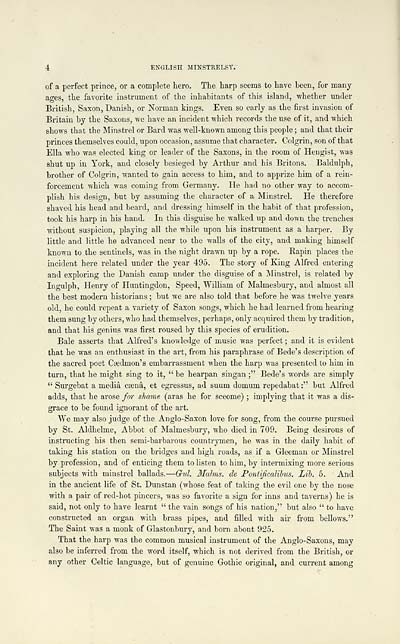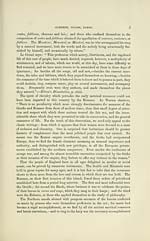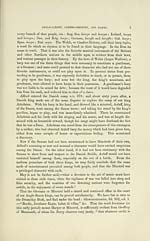Glen Collection of printed music > Printed text > Popular music of the olden time > Volume 1
(38) Page 4
Download files
Complete book:
Individual page:
Thumbnail gallery: Grid view | List view

4 ENGLISH MINSTRELSY.-
of a perfect prince, or a complete hero. The harp seems to have been, for many
ages, the favorite instrument of the inhabitants of this island, whether under
British, Saxon, Danish, or Norman kings. Even so early as the first invasion of
Britain by the Saxons, we have an incident which records the use of it, and which
shows that the Minstrel or Bard was well-known among this people ; and that their
princes themselves could, upon occasion, assume that character. Colgrin, son of that
Ella who was elected king or leader of the Saxons, in the room of Hengist, was
shut up in York, and closely besieged by Arthur and his Britons. Baldulph,
brother of Colgrin, wanted to gain access to him, and to apprize him of a rein-
forcement which was coming from Germany. He had no other way to accom-
plish his design, but by assuming the character of a Minstrel. He therefore
shaved his head and beard, and dressing himself in the habit of that profession,
took his harp in his hand. In this disguise he walked up and down the trenches
without suspicion, playing all the while upon his instrument as a harper. By
little and little he advanced near to the walls of the city, and making himself
known to the sentinels, was in the night drawn up by a rope. Rapin places the
incident here related under the year 495. The story of King Alfred entering
and exploring the Danish camp under the disguise of a Minstrel, is related by
Ingulph, Henry of Huntingdon, Speed, William of Malmesbury, and almost all
the best modern historians ; but we are also told that before he was twelve years
old, he could repeat a variety of Saxon songs, which he had learned from hearing
them sung by others, who had themselves, perhaps, only acquired them by tradition,
and that his genius was first roused by this species of erudition.
Bale asserts that Alfred's knowledge of music was perfect ; and it is evident
that he was an enthusiast in the art, from his paraphrase of Bede's description of
the sacred poet Csedmon's embarrassment when the harp was presented to him in
turn, that he might sing to it, " be hearpan singan ;" Bede's words are simply
" Surgebat a media csena, et egressus, ad suum domum repedabat :" but Alfred
adds, that he arose for shame (aras he for sceome) ; implying that it was a dis-
grace to be found ignorant of the art.
We may also judge of the Anglo-Saxon love for song, from the course pursued
by St. Aldhelme, Abbot of Malmesbury, who died in 709. Being desirous of
instructing his then semi-barbarous countrymen, he was in the daily habit of
taking his station on the bridges and high roads, as if a Gleeman or Minstrel
by profession, and of enticing them to listen to him, by intermixing more serious
subjects with minstrel ballads. — Grul. Malms, cle JPontificalibus. Lib. 5. And
in the ancient life of St. Dunstan (whose feat of taking the evil one by the nose
with a pair of red-hot pincers, was so favorite a sign for inns and taverns) he is
said, not only to have learnt " the vain songs of his nation," but also " to have
constructed an organ with brass pipes, and filled with air from bellows."
The Saint was a monk of Glastonbury, and born about 925.
That the harp was the common musical instrument of the Anglo-Saxons, may
also be inferred from the word itself, which is not derived from the British, or
any other Celtic language, but of genuine Gothic original, and current among
of a perfect prince, or a complete hero. The harp seems to have been, for many
ages, the favorite instrument of the inhabitants of this island, whether under
British, Saxon, Danish, or Norman kings. Even so early as the first invasion of
Britain by the Saxons, we have an incident which records the use of it, and which
shows that the Minstrel or Bard was well-known among this people ; and that their
princes themselves could, upon occasion, assume that character. Colgrin, son of that
Ella who was elected king or leader of the Saxons, in the room of Hengist, was
shut up in York, and closely besieged by Arthur and his Britons. Baldulph,
brother of Colgrin, wanted to gain access to him, and to apprize him of a rein-
forcement which was coming from Germany. He had no other way to accom-
plish his design, but by assuming the character of a Minstrel. He therefore
shaved his head and beard, and dressing himself in the habit of that profession,
took his harp in his hand. In this disguise he walked up and down the trenches
without suspicion, playing all the while upon his instrument as a harper. By
little and little he advanced near to the walls of the city, and making himself
known to the sentinels, was in the night drawn up by a rope. Rapin places the
incident here related under the year 495. The story of King Alfred entering
and exploring the Danish camp under the disguise of a Minstrel, is related by
Ingulph, Henry of Huntingdon, Speed, William of Malmesbury, and almost all
the best modern historians ; but we are also told that before he was twelve years
old, he could repeat a variety of Saxon songs, which he had learned from hearing
them sung by others, who had themselves, perhaps, only acquired them by tradition,
and that his genius was first roused by this species of erudition.
Bale asserts that Alfred's knowledge of music was perfect ; and it is evident
that he was an enthusiast in the art, from his paraphrase of Bede's description of
the sacred poet Csedmon's embarrassment when the harp was presented to him in
turn, that he might sing to it, " be hearpan singan ;" Bede's words are simply
" Surgebat a media csena, et egressus, ad suum domum repedabat :" but Alfred
adds, that he arose for shame (aras he for sceome) ; implying that it was a dis-
grace to be found ignorant of the art.
We may also judge of the Anglo-Saxon love for song, from the course pursued
by St. Aldhelme, Abbot of Malmesbury, who died in 709. Being desirous of
instructing his then semi-barbarous countrymen, he was in the daily habit of
taking his station on the bridges and high roads, as if a Gleeman or Minstrel
by profession, and of enticing them to listen to him, by intermixing more serious
subjects with minstrel ballads. — Grul. Malms, cle JPontificalibus. Lib. 5. And
in the ancient life of St. Dunstan (whose feat of taking the evil one by the nose
with a pair of red-hot pincers, was so favorite a sign for inns and taverns) he is
said, not only to have learnt " the vain songs of his nation," but also " to have
constructed an organ with brass pipes, and filled with air from bellows."
The Saint was a monk of Glastonbury, and born about 925.
That the harp was the common musical instrument of the Anglo-Saxons, may
also be inferred from the word itself, which is not derived from the British, or
any other Celtic language, but of genuine Gothic original, and current among
Set display mode to: Large image | Transcription
Images and transcriptions on this page, including medium image downloads, may be used under the Creative Commons Attribution 4.0 International Licence unless otherwise stated. ![]()
| Special collections of printed music > Glen Collection of printed music > Printed text > Popular music of the olden time > Volume 1 > (38) Page 4 |
|---|
| Permanent URL | https://digital.nls.uk/91367903 |
|---|
| Shelfmark | Glen.254 |
|---|---|
| Additional NLS resources: | |
| Attribution and copyright: |
|
| Description | Scottish songs and music of the 18th and early 19th centuries, including music for the Highland bagpipe. These are selected items from the collection of John Glen (1833 to 1904). Also includes a few manuscripts, some treatises, and other books on the subject. |
|---|
| Description | The Glen Collection and the Inglis Collection represent mainly 18th and 19th century Scottish music, including Scottish songs. The collections of Berlioz and Verdi collected by bibliographer Cecil Hopkinson contain contemporary and later editions of the works of the two composers Berlioz and Verdi. |
|---|

